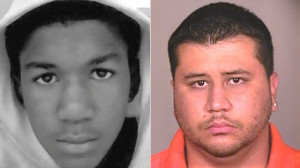
The news is once again a flutter with the George Zimmerman murder case for the shooting of Trayvon Martin last February. What once was prematurely characterized by the left-wing media as a hate crime and the right-wing media as the justifiable vigilante conduct of a devout second-amendment-er is now merely a run-of-the-mill over-publicized murder trial that will likely go before a jury and eagerly anticipating media this summer.
The reason for this early trial date, or a trial at all, is that today George Zimmerman declined to pursue an immunity hearing wherein he could invoke the “stand your ground“” defense and possibly be found by a judge to be immune from prosecution for murder.
Florida’s law, which has been oft quoted by the conservative right in coming to the aid of an accused murderer (a common practice as of late) as a preemptive attack on what they feel is a public backlash against gun ownership rights, is wholly inapplicable in Zimmerman’s case. “Stand your ground” is a statutory modification of the common law rule regarding the justifiable use of deadly force.
For those disinterested in reading an outline (word to my law school readers preparing for the bar exam, I feel you), under common law self defense, the use of deadly force could only be used if the victim (technically, the defendant in the criminal case) “retreats to the wall” before using such deadly force. The statutory language of “stand your ground” actually codifies an extension of “the castle doctrine,” which allows a person to stand his or her ground and not retreat if in his or her home. Florida’s statute extends this beyond the home and allows a person to “stand his or her ground and meet force with force, including deadly force if he or she reasonably believes it is necessary to do so to prevent death or great bodily harm to himself or herself or another or to prevent the commission of a forcible felony.”
The language of the statute itself and the statements made by Zimmerman to law enforcement in his 911 call make it clear that this statute is inapplicable to Zimmerman. When asked if Zimmerman was “following [Trayvon]” Zimmerman plainly answered “yeah.” Stand your ground allows a victim to defend his or her self will deadly force if “met with force.” It does not allow a defendant to pursue another citizen, engage in conflict, and then use deadly force. Zimmerman’s conduct is beyond the pale as it relates to stand your ground. Thus, it is not a proper defense in this case.
As an aside, a good defense would be the events as George Zimmerman and his brother have recounted them on multiple occasions. A fight or altercation that ensues between two people that escalates to or results in death can often be characterized as manslaughter, depending on the state statutes, and certainly does not rise to the level of maliciousness associated with a murder charge. This defense could mitigate the amount of time that Mr. Zimmerman would serve for his conduct, and is a good strategy for an attorney representing this defendant.
Regardless of how you feel about gun control, race relations in the south, or the goings-on between an armed neighborhood watchman and a hooded teenager with a bag of skittles and an iced-tea, stand your ground does not justify forging new ground, and Zimmerman’s legal team is right to leave this second amendment baiting to rest for the sake of their client.